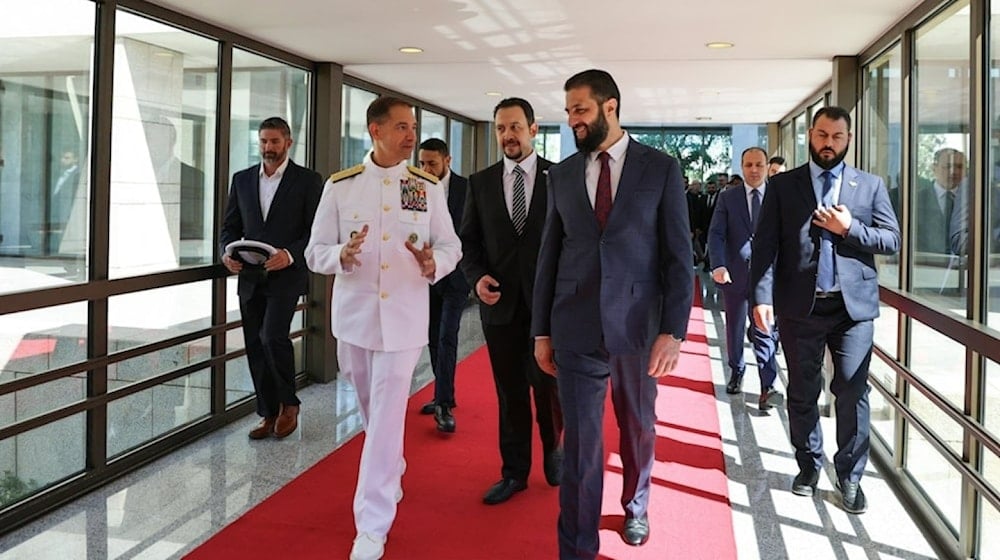Al-Sharaa meets US CENTCOM commander, envoy Barrack in Damascus
Syria's interim President Ahmed al-Sharaa hosted senior US officials in Damascus for talks on political and military cooperation, a rare engagement that comes amid Russian and Saudi moves to expand influence in the country's transition.
-

Interim President Ahmad Al-Sharaa receives the Commander of US Central Command in Damascus (Syrian Presidency)
Syria's interim President, Ahmed al-Sharaa, met on Friday with US Central Command (CENTCOM) chief Adm. Brad Cooper and US Special Envoy for Syria Thomas Barrack at the People's Palace in Damascus.
The talks, attended by several Syrian interim ministers and senior officials, mark one of the most high-profile US visits to Syria since the country's political transition was declared in March.
According to the Syrian Presidency, discussions focused on "prospects for cooperation in the political and military fields, in a manner that serves common interests and strengthens the foundations of security and stability in Syria and the region." The statement described the meeting as reflecting "a positive atmosphere and a shared commitment to enhancing the strategic partnership and broadening communication channels between Damascus and Washington."
استقبل السيد أحمد الشرع رئيس الجمهورية العربية السورية، وعقيلته السيدة لطيفة الدروبي، في قصر الشعب بدمشق اليوم، الأدميرال تشارلز برادلي كوبر، قائد القيادة المركزية الأمريكية، وعقيلته السيدة سوزان كوبر، إلى جانب المبعوث الخاص للولايات المتحدة الأمريكية إلى سوريا السيد توماس باراك،… pic.twitter.com/4LVV5Rt3Dq
— رئاسة الجمهورية العربية السورية (@SyPresidency) September 12, 2025
The encounter builds on previous contacts: al-Sharaa had hosted a US Congressional delegation late last month, and on August 25, met separately with Envoy Barrack. Washington’s increasing engagement comes at a sensitive time, as CENTCOM continues to raise concerns over lingering threats from Islamic State remnants and the challenges of integrating armed formations into Syria’s new political order.
The visit also takes place against a backdrop of intensified regional diplomacy. On September 9, a senior Russian delegation arrived in Damascus for talks on economic and security cooperation, while just a day earlier, reports confirmed that Saudi Arabia will begin supplying crude oil to Syria to support recovery efforts.
Read more: Stability unachievable under Israeli aggression: Syria FM
Analysts note that these parallel tracks point to mounting competition between Washington and Moscow for influence over Syria’s reconstruction and security future. While Russia has leveraged its military bases and energy projects to entrench its position, US overtures signal a renewed attempt to reinsert itself into the country’s political landscape.
At the same time, speculation persists over whether Syria’s transition may eventually intersect with US-led regional normalization efforts involving "Israel," though core disputes such as the Golan Heights and ongoing Israeli strikes inside Syria remain unresolved obstacles.

 2 Min Read
2 Min Read










